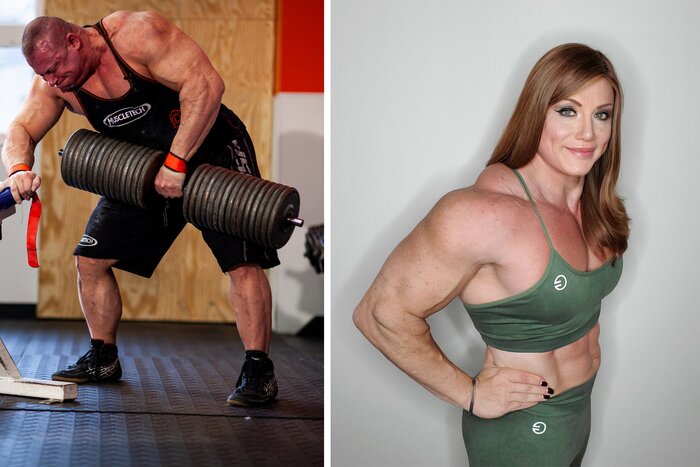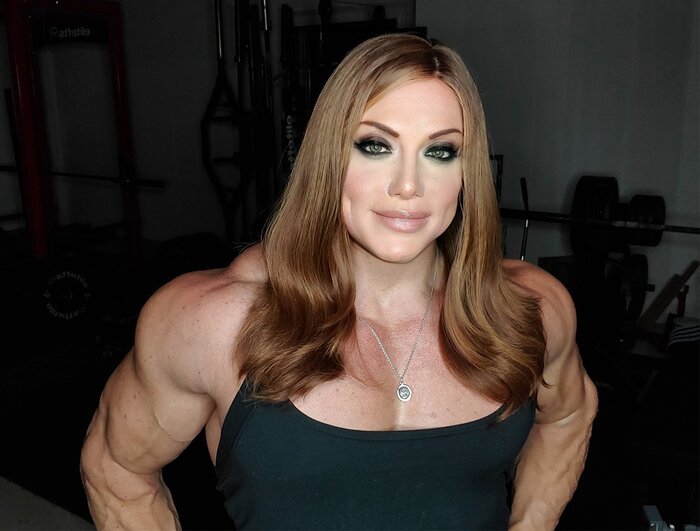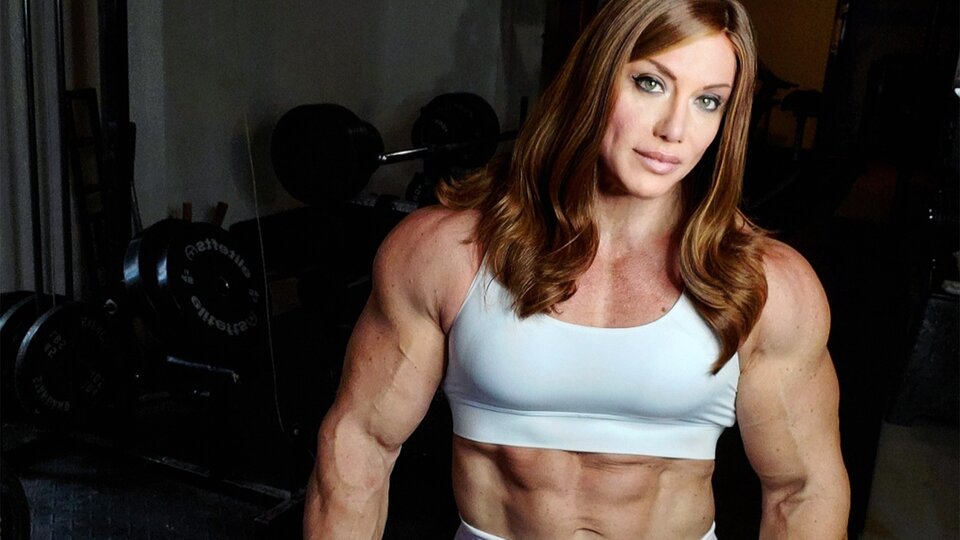Janae Marie Kroczaleski is a master of change. But nothing she does is by accident. She has spent decades building immense strength and power in the weight room, then relentlessly applied that strength to build the life she wants. Under the name Matt, she was an elite powerlifter and bodybuilder for a career lasting over 20 years. After conquering the all-time powerlifting total in the 220-pound class in 2009, there was almost nobody as strong on the planet. How strong? In a video for Bodybuilding.com in 2013, she performed sets of single-arm ”Kroc rows” using 310-pound dumbbells.
Then, in 2015, Matt publicly transitioned to Janae Marie Kroc, a transgender/gender-fluid she/her. She has spoken at numerous seminars, been the subject of the award-winning documentary ”Transformer,” and has been a tireless advocate and example for the LGBTQ community.
Through it all, one thing has never changed: her passion for training and preparing herself for the next challenge. Fresh from the opening of her namesake gym, Kroc’s Gym, in the Detroit suburbs, Janae Marie shared how the lifting life prepared her for every challenge she has faced.
Nobody’s Gonna Stop Me
When I was deep into powerlifting, there were no excuses—ever. I benched on my wedding day.
When I was prepping for my first big nationals, I would go to class all day and come home between classes to see my wife and young sons. Then I’d work at the pharmacy as an intern in the evening and get home at 11 p.m. About midnight, I would literally break into the gym, which was in the basement of the oldest building on campus. Sometimes, I was climbing through windows and prying open doors—whatever I had to do.
But in my mind, there was no other option. If the only time I can squat is at 3 a.m., I’m gonna f**king squat at 3, and nobody’s gonna stop me.
I Just Didn’t See Limits
People used to ask me when I was younger, ”How big do you want to be?” And I always said, “There’s no limit. I want to be so big that when I walk in a room, no matter who they’ve seen, people say I’m the biggest motherf**ker they’ve ever seen.” I just didn’t see limits.
Some people would be intimidated by certain numbers, like maybe a 500-pound bench press or 1,000-pound squat. I thought, ”If can squat 1,000, why not 1,010? Why not 1,020?” It was infinite.
Born to Lift
Some people just have deep passions that they’ve always been drawn to. Just every moment in their free time, that’s what they’re studying and thinking about—that’s what lifting was for me.
I remember being a young child, maybe four or five, and seeing someone big and strong, and just being in awe and thinking, ”That’s how I want to be.”

The hard part was that at the same time, from around the same age, I had this overwhelming feeling that I was supposed to be female. It felt like there were these two opposing forces based on what society had taught me. I always struggled with it at a young age, like, ”If I’m really a girl, why am I so interested in lifting when I was always taught to believe that is a very masculine thing?” But it was just something that I had an innate desire to do.
Everybody Knew Who I Was
Looking back, my success in powerlifting absolutely prepared me for the scrutiny I faced coming out as trans. After I won the Arnold [Powerlifting Championship] in 2006, I went from being someone only local people in Michigan knew to all of a sudden everybody knew who I was. I was the topic on all these forums all over the place. There were fans, but also plenty of people who would just rip me apart.
I got used to people talking about me—people who didn’t know me, saying nasty things that weren’t true. Pretty quickly I was able to build a thick skin and laugh at it. I recognized that it had less to do with me than it did with them.
Once I started going out as a trans woman, sure, I had a few incidents where people harassed me. I had a close call where five guys followed me into a parking garage late at night. They were about to jump me, and I think the only thing that stopped them was when they got close and realized how muscular I was. I can only guess that made them second-guess their decision.
A Lifestyle Change
There was a short period where I tried to give up lifting, when I initially started transitioning. I thought, ”I need to be this skinny little thing if I’m going to be a woman. I need to be 135 pounds.” Then I actually dropped 72 pounds in four and a half months. I went from 272 down to 200, and I got to a point where I was eating probably 1,200-1,500 calories a day.
Of course, that wasn’t sustainable. I killed my metabolism and stopped losing weight. My body was like, ”What the hell’s going on?” And I realized a couple of things I had done wrong: Number one was I treated it like a contest diet, but this needed to be a lifestyle change.
Number two was thinking I had to give up the things I loved doing to be who I felt I truly was. Sure, there are some changes I want to make, but that doesn’t mean they can’t be part of my life.
Just a Woman Who Is Passionate about Strength Training
One of my big concerns when I first came out was that I thought a lot of women were going to be upset and see me as some kind of intruder or fake. But it was exactly the opposite. The female strength community really embraced me.

They understood my struggle with wanting to be more feminine, but also liking being bigger and stronger. They knew all this pushback from friends, family, and society about, ”That’s not what a woman is supposed to do.” And so many of them struggled with the exact same body issues, like ”Oh, my waist is thick from all these heavy weights. I don’t have a figure. My breasts are small.”
That helped me really understand that my identity is what it is. I’m just a woman who is passionate about strength training. And that brought me a lot of peace.
Starting Over at the Bottom
Today, my priorities have shifted. I want to be as strong as I can be, but I’m more concerned with overall athleticism. I got into mountain biking and then jiujitsu. I’m still trying to slim down now, both for jiujitsu and because it just feels better. I move better. I’m more flexible.
It’s actually been really, really fun starting over at the bottom of something—something brand new that I suck at. At first, I was going there and getting choked out by everybody. Now I’ve been doing it for almost a year, and I’ve learned a ton. But I’m still barely scratching the surface.
That’s what is really fun for me: that process of learning and constantly improving.
There Are No Rules to Being You
I get a lot of messages from trans people who can relate to my story. Maybe they’re into lifting weights or other pursuits that aren’t typically associated with someone who’s trans. This idea that you can’t participate in these things, or worse yet, that you have to give them up, is complete baloney. Anything that’s considered ”masculine,” you can find women doing it. Whether that’s drag racing, being into old muscle cars, lifting weights, or martial arts.
For a long time I was in denial, but it was just because I’d never heard of a trans person like me—anyone who was such an alpha male, so into strength and power. That’s why I always tell people today, ”Look, there are no rules to being you. There is no ’you can’t do this, or you can’t do that.’ If it brings you authentic joy, then that’s fine. That’s part of you. Your identity is what it is. And it’s yours.”
